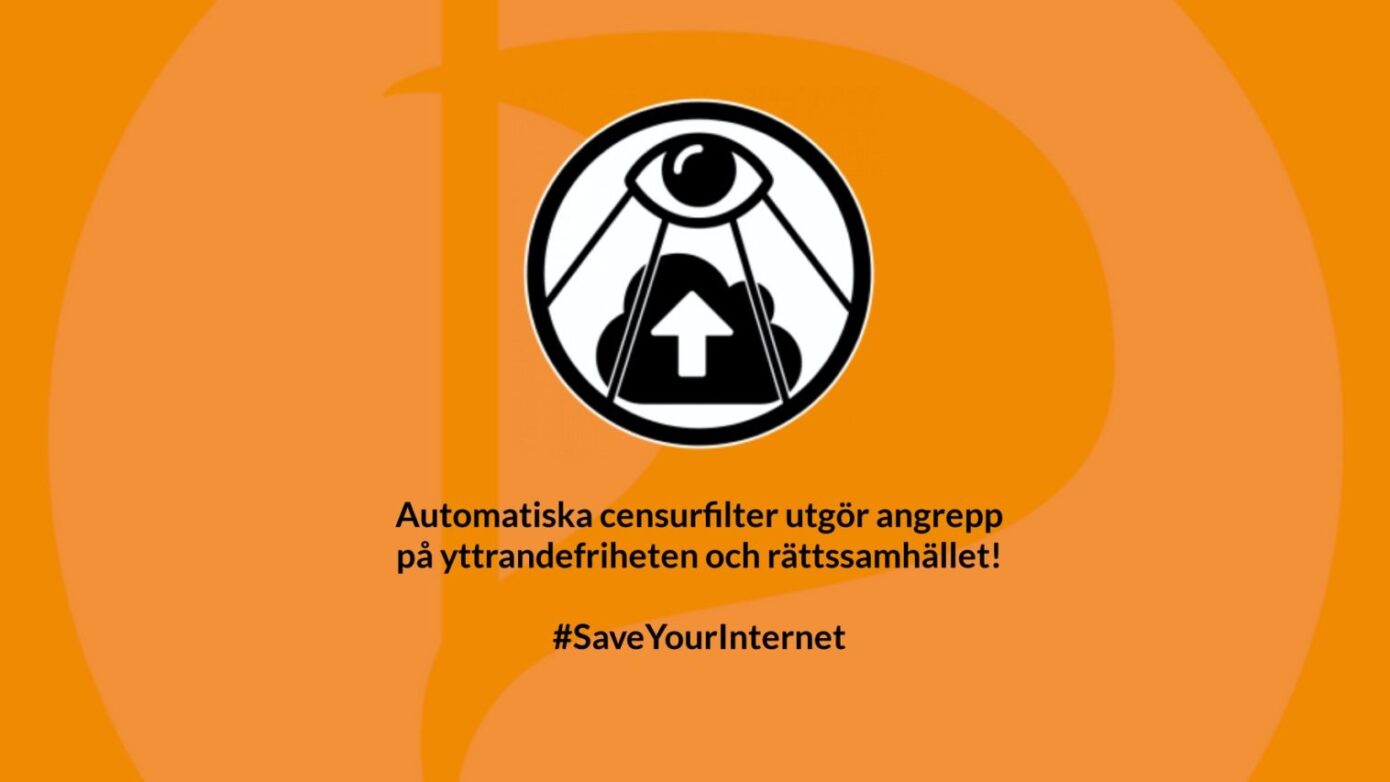För några dagar sedan röstade EU-parlamentets utskott LIBE för att godkänna trilog-kompromissen om TERREG. De röstade bland annat för att myndigheter ska kunna begära att nätplattformar tar bort material som myndigheten anser är terrorism inom en timme.
Något annat som är anmärkningsvärt i TERREG, som sägs vara en lag för att få bukt med terrorism på nätet, är frånvaron av ett krav på att rapportera terrorism till polisen. Om man faktiskt velat få stopp på brottsligt agerande, så vore det väl rimligt att utreda brott och döma brottslingarna?
TERREG ställer många krav på plattformar, bland annat att inkludera i sina användaravtal att terrorisminnehåll är förbjudet. De måste också säkerställa att denna paragraf i deras användaravtal inte är en papperstiger. I lagtexten står det ”include in their terms and conditions, and apply” (vår emfas) gällande paragrafer mot spridning av terrorism. TERREG försöker alltså tvinga fram ett beteende från nätplattformar där de själva håller på koll på sina användare och beivrar ifall de begår brott. Plattformarna ska agera som en privat polis.
Myndigheter kan dessutom på vissa grunder deklarera att en plattform är ”exposed” för spridning av terrorism, varpå vissa särskilda krav införs. Då ska plattformar vidta ”specific measures” (tidigare ”proactive measures”). En ”specific measure” kan vara att anställa fler människor för att kontinuerligt granska material på plattformen eller ”any other measure that the hosting service provider considers appropriate”, till exempel uppladdningsfilter.
TERREG ställer en del krav på hur plattformar ska agera när de försöker stoppa spridningen av terrorisminnehåll, de ska bland annat inte agera diskriminerande. Men hur dessa krav i praktiken ska kunna implementeras är väldigt oklart.
Men varför är det plattformarnas ansvar att hantera material som klart och tydligt är brottsligt? Hur kommer det sig att bland annat den svenska regeringen (som stöttar TERREG) föredrar att privata företag ska sköta brottsbekämpning framom deras eget rättsväsende? Är inte ett av statens allra mest centrala uppdrag att sköta rättsväsendet, just för att det ska vara icke-diskriminerande, rättvist och följa rättssäkerhetsprinciper?
Särskilt tydligt att man är ointresserade av att faktiskt utreda brott blir det när man ur TERREG utelämnar krav på att rapporterat och upptäckt terrorisminnehåll ska rapporteras till polis innan det tas bort. Man vill alltså hellre att plattformar tar bort brottsligt material, än att säkra bevisning för brottsutredning.
Den här typen av privatisering av rättsväsendet är fullständigt oacceptabel, och den blir inte mindre oacceptabel för att det som är aktuellt är en reglering av internet. Många politiker gillar att säga att ”det som är olagligt offline vara olagligt online”. Det är visserligen nonsens (självklart är det som är olagligt offline också olagligt online!), men det är uppenbart att man inte tror på sina egna ord när man skapar vad som i praktiken är på väg att bli separata jurisdiktioner på nätet.
Piratpartiet vill att brottslighet som begås med hjälp av internet ska utredas som vilka andra brott som helst. Bara för att internet är inblandat är det inte berättigat att privatisera rättsväsendet till nätjättarna. Det är en skandal.
Overall, this regulation is unlikely to prevent terrorist attacks. To prevent terrorist radicalisation and recruitment, it would make more sense to address legitimate grievances such as discrimination against Muslims and human rights violations, and to provide stable funding for civil society work against hate ideology and Islamism, as well as de-radicalisation and exit programmes. Finally, vigorously prosecuting terrorism and messages inciting terrorist actions is of essence. Too often, terrorists have been known to the police for a long time, but their tracks have not been followed up. Yet the new terrorist content online regulation fails to oblige platforms to report criminal terrorist speech to the police, because governments consider systematic prosecution is too much work. This is scandalous.”
Patrick Breyer, EU-parlamentariker för tyska Piratpartiet
För den intresserade är här den relevanta paragrafen om ”specific measures” från TERREG:
Specific measures
- Hosting service providers exposed to terrorist content shall, where applicable, include in their terms and conditions, and apply, provisions to address the misuse of their service for the dissemination to the public of terrorist content online. They shall do so in a diligent, proportionate and non-discriminatory manner, and with due regard in all circumstances to the fundamental rights of the users and take into account the fundamental importance of the freedom of expression and information in an open and democratic society and with a view to avoiding the removal of material which is not terrorist content.
Where a hosting service provider is exposed to terrorist content in accordance with paragraph 4, it shall take specific measures to protect their services against the dissemination to the public of terrorist content.
The decision as to the choice of specific measures shall remain with the hosting service provider. Those measures may include one or more of the following:
- appropriate technical and operational measures or capacities such as appropriate staffing or technical means to identify and expeditiously remove or disable access to terrorist content;
- easily accessible and user-friendly mechanisms for users to report or flag to the hosting service provider alleged terrorist content;
- any other mechanisms to increase the awareness of terrorist content on its services such as mechanisms for users moderation;
- any other measure that the hosting service provider considers appropriate to address the availability of terrorist content on its services.
- Any specific measure or measures that a hosting service provider takes pursuant to paragraph 2 shall meet all of the following requirements:
(a) they shall be effective in mitigating the level of exposure to terrorist content;
(b) they shall be targeted and proportionate, taking into account, in particular, the seriousness of the level of exposure to terrorist content as well as the technical and operational capabilities, financial strength, the number of users of the hosting service provider and the amount of content they provide;
(c) they shall be applied taking full account of the rights and legitimate interest of the users, in particular users’ fundamental rights to freedom of expression and of information, to respect for private life and to protection of personal data;
(d) they shall be applied in a diligent and non-discriminatory manner;
Where they involve the use of technical measures, appropriate and effective safeguards shall be provided to ensure accuracy and to avoid the removal of information that is not terrorist content, in particular through human oversight and verification.
4. For the purposes of paragraph 2, a hosting service provider shall be considered to be exposed to terrorist content, where the competent authority of the Member State of its main establishment has informed the hosting service provider, through a decision based on objective factors, such as the hosting service provider having received two or more final removal orders in the previous 12 months that it considers the hosting service provider to be exposed to terrorist content.
5. After having received the decision referred to in paragraph 4 and, where relevant, paragraph 6, a hosting service provider shall report to the competent authority on the specific measures it has taken and that it intends to take in order to comply with the requirement laid down in paragraphs 2 and 3. It shall do so within three months of receipt of the decision and on an annual basis thereafter. This obligation ceases once the competent authority has confirmed that the hosting service provider is no longer obliged pursuant to paragraph 2 after a request pursuant to paragraph 7.
6. Where, based on the reports referred to in paragraph 5 and, where relevant, any other objective factors, the competent authority considers that the measures that a hosting provider has taken do not meet the requirements of paragraphs 2 and 3, the competent authority shall address a decision to the hosting service provider requiring it to take the necessary measures so as to ensure that those requirements are met. The decision as to the choice of measures remains with the hosting service provider.
7. A hosting service provider may, at any time, request the competent authority to review and, where appropriate, adjust or revoke the decisions referred to in paragraphs 4 and 6. The competent authority shall, within three months of receipt of the request, take a reasoned decision based on objective factors on the request and inform the hosting service provider accordingly.
8. Any requirement to take measures pursuant to this Article shall be without prejudice to Article 15 of Directive 2000/31/EC and shall not entail a general obligation on hosting services providers to monitor the information, which they store, nor a general obligation to actively seek facts or circumstances indicating illegal activity. Any requirement to take measures pursuant to this Article shall not include an obligation to use automated tools by the hosting service provider.


